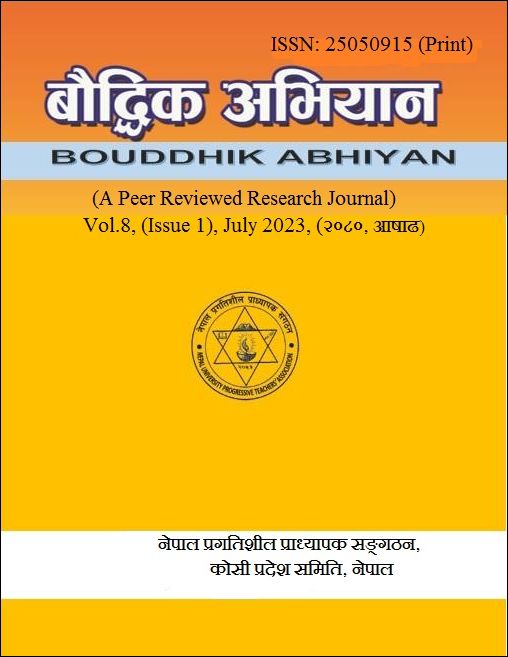मर्नैजति परेपछि कथासङ्ग्रहका कथामा लैङ्गिक शक्तिसम्बन्ध (Gender power relations in the stories of the anthology 'Marnejati Parepachhi')
DOI:
https://doi.org/10.3126/bdkan.v8i01.57782Keywords:
उत्पीडन (oppression), प्रभुत्व (dominance), वर्चस्व (hegemony), लैङ्गिक शक्तिसम्बन्ध (gender power relations), सामन्तवादी विमर्शात्मक संरचना (feudal discursive structures)Abstract
माधवलाल कर्माचार्यको मर्नैजति परेपछि (२००९) कथासङ्ग्रह सामाजिक यथार्थवादी कथाको सङ्कलन हो । यस कथासङ्ग्रहका सोद्देश्य नमुना छनोट गरिएका ‘तिनको शृङ्गार’ र ‘तिनी फर्कंदा’ कथामा तत्कालीन पुरुषवादी सामन्ती पितृसत्तात्मक चिन्तन, चरित्र र तिनका व्यवहारको प्रतिनिधित्व गराई निरीह नारीजीवनका यथार्थलाई प्रस्तुत गरिएको छ । सर्वेक्षण, सूक्ष्म पठन तथा पाठविश्लेषणको विधि प्रयोग गरी समग्रमा विश्लेषणात्मक विधिमार्फत सामान्यीकृत निष्कर्ष प्रस्तुत गरिएको प्रस्तुत सङ्ग्रहका कथामा सांस्कृतिक अध्ययनअन्तर्गत लैङ्गिक शक्तिसम्बन्धको खोजी र विश्लेषण गरिएको छ । तत्कालीन पितृसत्तात्मक सामन्ती चिन्तन र व्यवहार भएको पुरुषमुखी लैङ्गिक सम्बन्ध र पितृसत्ताकै केन्द्रमा लैङ्गिक विचारधारा प्रतिनिधित्व गराइएको उल्लिखित कथाहरूमा वैरभावपूर्ण लैङ्गिक सम्बन्ध, नकारात्मक लैङ्गिक भूमिका, परम्परागत पितृसत्ता, हिंसा र आपराधीकरणको चित्रण गरिएको छ । निम्न वर्गीय पुरुष र नारी चरित्रका लैङ्गिक समस्याको मूल कारकका रूपमा पितृसत्तागत अहम् र दम्भ रहेको छ । यी कथामा मानिसको प्राकृतिक लिङ्गका विपरीत सामाजिक, सांस्कृतिक आधारमा निर्मित विभेदकारी लैङ्गिक सम्बन्ध स्थापित भएको छ । त्यसले पारिवारिक र सामाजिक सत्ता पुरुषका हातमा सुम्पिएर असमान लैङ्गिक सम्बन्ध निर्माण गरेको छ । यी कथामा तत्कालीन सामन्तवादी विमर्शात्मक संरचनामा उत्पादनका साधन, वितरण प्रणाली र श्रमको मूल्य निर्धारणमा नारीको सहभागिता शून्य भएकाले नारीहरूको अवस्था अधीनस्थ बनेको देखाइएको छ । कथामा प्रस्तुत सबै तथ्यहरूलाई आधार मानी तत्कालीन समाजको लैङ्गिक सम्बन्ध असमानतापूर्ण थियो भन्ने निष्कर्ष विश्लेष्य कथामा प्रस्तुत गरिएको छ ।
(The anthology 'Marnejati Parepachhi'(2009) by Madhavalal Karmacharya, is a collection of social realistic stories. In the stories 'Tinko Shringar' and 'Tini Farkanda', which were selected purposefully from this collection of stories, the reality of innocent women's life is presented by representing the male feudal patriarchal thinking, character and their behavior at that time. Gender power relations have been searched and analyzed in cultural studies in this collection of stories, which has presented generalized conclusions through analytical approach using the methods such as survey, micro-reading and text analysis. Male-dominated gender relations with patriarchal feudal thinking and behavior of that time and gender ideology represented at the center of patriarchy have been depicted in the mentioned stories of antagonistic gender relations, negative gender roles, traditional patriarchy, violence and criminalization. Patriarchal pride and arrogance are the root cause of gender problems of lower-class male and female characters. In these stories, discriminated gender relations created on social and cultural basis have been established in contrast to the natural gender of human beings. It has given family and social power in the hands of men and created unequal gender relations. In these stories, it is shown that the condition of women has become subservient due to the zero participation of women in determining the prices of production, distribution system and labor in the then feudal discursive structure. Based on all the facts presented in the story, the conclusion has been drawn that gender relations in the society at that time was unequal.)




